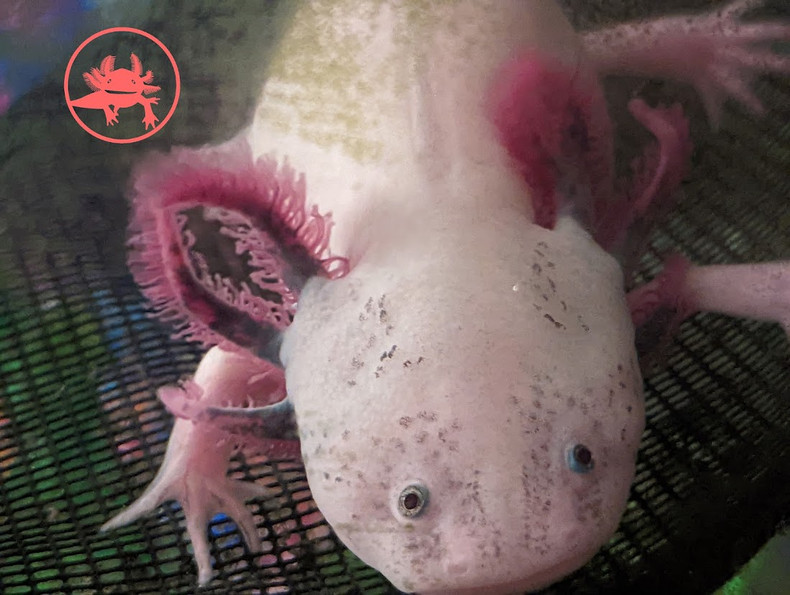People trying to research axolotl care online are often scared off - or, at least, given a great deal of anxiety - by the horror stories on axolotl fan sites telling disturbing tales of crashing nitrogen cycles, implausible injuries, unidentified disease, etc. You have to keep in mind that people don't generally write lengthy posts about how well everything has been going - and that there are a lot of "Karens and Kens" with an internet connection and too much time on their hands.
I
have had pet axolotls continuously since 2006, and have been breeding them for
education, research, and later for income since 2009. In all of that
time, to the best of my knowledge, I have lost only four adults (ie; over one
year old). That is out of HUNDREDS of adults that I have had over the
years. A quick summary of the causes: One of the first three I had
was attacked by a cat. Another died of infection from an injury (back
when I didn't know how to deal with things like that). One (Lokai from
our profile pic) had an oral tumor when he was seven years old (the only such
case I have seen). Another (one of the original "silver"
axanthics from IU) died for no apparent reason at all at six years old.
It happens.
In
reality axolotl care isn't that challenging. They are just not terribly
fragile creatures. As with raising children you will make mistakes now and
then, but most of those are not tragic - just annoying little learning
experiences (and, unlike children, even if they turn into Hitler they can't get
out of the tank for long anyway).
When
I am asked how long axolotls live, my standard answer is "10-15
years". In truth, that is an overly simplistic answer. Several
of the animals in my colony are well over ten years. Some at the
Ambystoma Genetic Stock Center are well over 20! Their lifespan is
determined by a combination of genetics and consistent care.
So to
ease a few minds, and to see that everything is going to work out just fine,
here are info of four of my older axolotls. The first three were
hatched and raised here, and the fourth was a rescue.
If
you have come to see us at any of the shows, You will have met Feathers.
She is the one that begs everyone for treats and often sits in my hand to get
her belly rubbed. Feathers is a female melanoid leucistic. She
hatched in June of 2011, so will be 12 this year, and is a bit over 11
inches. Feathers has attended every trade show we've vended for the last
ten years (and clearly this "stressful treatment" hasn't harmed
her). She seems to like people, and is actually much more active and
social with the crowd at a show than she is at home. And btw; She has eaten
nothing but cheap floating pellets since she was three months old. I couldn't
find a baby pic of Feathers, but I did find one from May of 2013 when she
produced her first clutch. As you can see, the little smeared mascara
mark over her left eye and her gill stalks have darkened with age.
Darkening of melanophores with age is typical of all leucies.
Crystal
is a female GFP wild-type that hatched in December of 2009. She has
multiple hets - all but "white"; In fact, she was my inspiration for
producing the first of my "penta-het" axolotls back in 2013. She
spent most of her early life in a Biology classroom, and has been poked and
prodded a great deal. She is now just over 11 inches. Her baby pic
is from March of 2010 when she was about four months old.
Gandalf
('cause he's Gray, of course) hatched in May of 2009. He is the original
source of the GFP gene in one of my GFP leucy lines. He's just over 12
inches. As is true of most axolotls, his gills have gotten shorter over the
years, but he is still very active and has a lot of personality.
Sunspot
was brought to me in 2008 by a college student who was moving and couldn't take
her along. At the time she was about two years old. So...
she's 17? The student clearly didn't want to part with her, so I promised
that I would take good care of her, and if she ever wanted her back all she had
to do was ask. She was all white when I got her, but developed a gold
spot with iridophores on her right side when she was about eight years
old. She never had spectacular gills, and today they are very
small. Unfortunately I never heard from her original owner again, and
have lost all contact information. If anyone has a clue who this girl was,
please message me at https://www.facebook.com/strohlsherps

